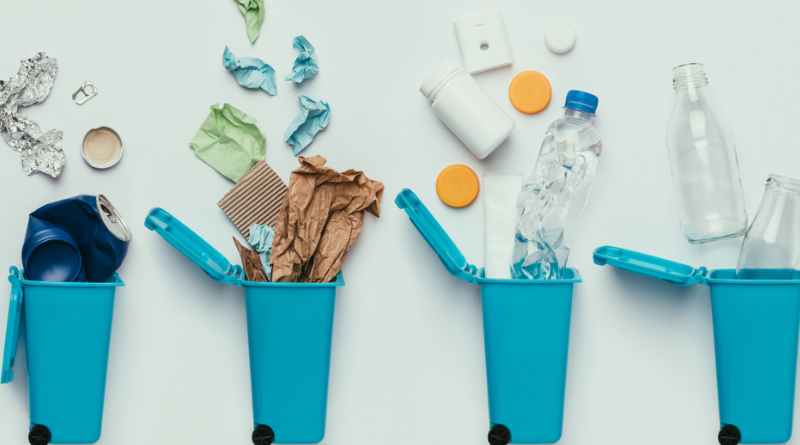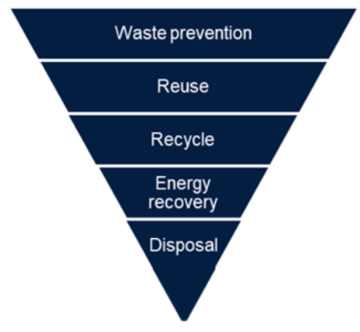Reduce, Reuse, Recycle
With nearly 24,000 students and more than 13,600 members of staff we can generate a considerable amount of waste
So managing this waste responsibly is a key focus. Our aim is to reduce the amount of waste created in the first place, and reuse and recycle as much as possible across the University. This in turn will reduce greenhouse gas emissions and waste disposal costs.

Did you know?
Since 2014, 100% of waste through our main waste contract has been diverted from landfill.

The Waste Hierarchy
We are managing waste by:
- increasing the reuse of materials across the University through a sharing portal – WARPit.
- working with our waste service provider to increase recycling and to monitor and measure waste production.
- working in partnership with colleges, staff and students to develop solutions for reducing the University’s waste.
The waste hierarchy is a good way to think about how we manage waste. The best option is to prevent waste from being produced in the first place. The least preferred option is disposal or landfill.
The higher up the waste hierarchy our actions are, the better for the environment.
Reducing waste together
By taking simple steps, we can all reduce our impact on the environment and make savings at the same time. Whether you work, study or are visiting the University, we all need to play our part. Together we can become more responsible reducers, reusers and recyclers!
See below for how we:
Our primary aim is to prevent and reduce waste in the first place. We aim to do this by giving staff, students and visitors the support they need to make greener choices from the outset.
Green Impact, the University's environmental accreditation scheme, plays a pivotal role in this. The scheme supports and encourages departments and colleges across the University to reduce their own environmental impacts. This includes practical ways to reduce waste, use materials wisely and reduce costs.
So if you're a student or staff member keen to make sustainable changes in your immediate environment, take a closer look:
How to reduce your waste
Follow the waste hierarchy. The most favourable options are prevention, reduction and reuse. The least favourable is disposal through landfill. The higher up the waste hierarchy the better!
Ask yourself if you really need to create the waste in the first place? For example, if you're buying something new – for yourself or your department - do you really need it? Or can you reuse or mend an existing item? Could you use less?
If you really do need to make a purchase then think of the following:
Reduce: do you need the quantity identified, or can you buy materials with recyclable content? Use only what you need including only making up the solution you need in your laboratory. Purchase items in bulk to avoid individual wrapping.
Reuse: can an item be repaired or upgraded or can someone else use it? Visit WARPit recycle: if you can't prevent, reduce or reuse the waste, take care to segregate the waste to facilitate its recovery. If it can't be recycled, waste can be incinerated and energy recovered from it.
For more details on responsible purchasing please visit Sustainable Purchasing.
To help the environment and save paper, try not to print.
If printing is unavoidable then:
- use the double sided ‘duplex’ function for any printing and photocopying.
- select ‘Grayscale’ in the ‘Colour’ tab of ‘Printer Properties’ to convert a colour document into black and white.
- use a photocopier to make multiple copies of documents. It's cheaper than printing.
- reduce report sizes and quantity of your print run – less reading and less paper!
- re-use single sided printouts as note paper? (provided it doesn't contain sensitive or confidential material).
- recycle any used printer cartridges.
One of the ways we reduce the amount of waste produced by the University is by encouraging staff to reuse items. We do this primarily through WARPit (Waste Action Reuse Portal).
By registering to use the University’s WARPit account a department or college can post or claim otherwise unwanted items from across the University. The most popular items are office furniture and office supplies but there is so much more. Using WARPit can really help departments to reduce their purchasing and disposal costs. As well as helping the University reduce its environmental impact.
Please note: the system is not for staff or students' personal use or personal items.
As well as WARPit, staff and students can take the following actions:
- find out more about UniGreenScheme, one of the University's preferred suppliers. They collect, store and sell surplus equipment and return a share of the profits to the department. The income returned is 50% of the proceeds of any sale, less any direct costs. For more information contact Luke Johnson at luke.johnson@admin.ox.ac.uk or visit UniGreenScheme.
- make use of reusable cups and cutlery including discounts for hot drinks served in reusable cups at many outlets.
- avoid the use of single use plastics including bags, cutlery, take away food boxes and lunch wrappers.
- work with suppliers or select options for reusable packaging. For more details on responsible purchasing please visit Sustainable Purchasing.
Did you know?
The University recycles over 50 tonnes of waste a month, including food waste.
Unless there are operational space restrictions all University sites must recycle waste. Select Environmental manages the University’s non-hazardous waste programme.
The University disposes of most recyclable non-hazardous material through the Dry Mixed Recycling (DMR) bins.
Materials you can place in these bins include plastic bottles, paper, cardboard and metal cans. Please note – glass must not be placed in these bins.
For the correct recycling of the most common specific materials and key waste streams see our A-Z of Recycling.
This will help you to categorise and identify the main materials and help you be a more responsible recycler.
Useful contacts for non-hazardous waste
If you work at the University, please ensure you speak to the appropriate individuals on your site before disposing or arranging waste collections.
For non-hazardous waste in general speak first with your Building, Facilities, Office manager, Head of Department or Administrator as appropriate before arranging your own collections.
If you are an FM managed building you can log many waste requests through FM online. Select Environmental is the University only preferred waste provider for non-hazardous general trade waste.
Select Environmental Account Manager contact details: email oxford@selectenviro.co.uk or call 0118 975 9000 / 0770880 4333
Estates Services can also assist with non-hazardous waste. Email wastemangement@admin.ox.ac.uk
The University has a policy and process to manage the appropriate disposal of hazardous waste. For all matters concerning hazardous waste staff should visit the Safety Office’s Hazardous waste webpage.



